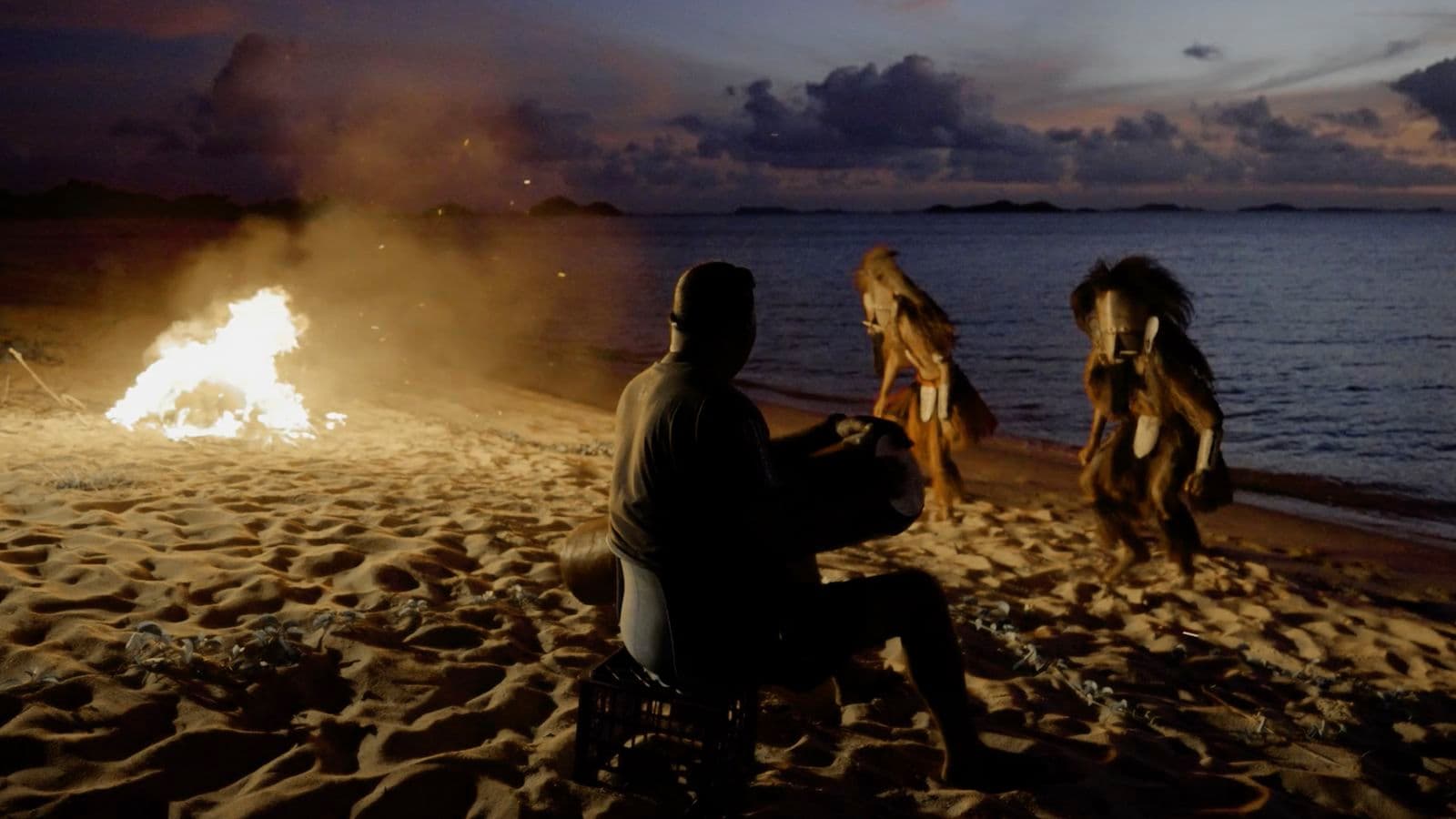BHENJI RA — Know My Name

Club Ate, In Muva We Trust, 2020 four-channel 4K moving image, colour, no sound, 6:00 minutes Production: The Electric Canvas Director & VFX: Tristan Jalleh Costume design: Matthew Stegh Makeup: Kiki Targé Producer: Christina Ra Production assistants: Emmett Aldred & Xeno Genesis Director of photography: Ryan Alexander Lloyd Camera assistant: Bryn Whitie Photogrammetry assistant: Andre Piquet Purchased 2019
DR SHAUNE LAKIN takes a look at artist BHENJI RA, whose practice combines dance, choreography, video, installation and club events.
Sydney-based artist Bhenji Ra’s practice is deeply informed by who she is as a trans person of Filipino descent and her critical engagement with the ways that power structures — colonialism, patriarchy and capitalism — impact on identity and agency. Bhenji studied contemporary dance with the Martha Graham School in New York and then at the celebrated Western Australian Academy of Performing Arts in Perth. Recently, she has moved away from contemporary dance, to create complex performances and highly collaborative social spaces of inclusion, places for what she calls ‘radical togetherness’.

Bhenji Ra, for anito | all idols, 2017, digital photography by Tristan Jalleh
In 2014, Bhenji formed the collective Club Ate with Justin Shoulder, who, like Bhenji, is a member of the queer diaspora and has Filipino ancestry. Club Ate has developed an interdisciplinary practice drawing on performance, moving image, installation, critical theory and social practice. While Club Ate works institutionally (including projects with major public collections nationally and internationally), they have maintained a close connection to their roots in Sydney’s queer club scene and the Asia–Pacific diaspora.
In 2020, as part of the Enlighten Festival and commissioned by the National Gallery, Club Ate illuminated the Gallery’s facade with In Muva we trust — animated imagery elaborating ideas that they refer to as ‘Future folklore’. The projection draws together indigenous Filipino creation myths, pop cultural references and a fluid, fantastical digital landscape — a spectacular ‘skyworld’ — to in effect ‘queer’ the building’s monumental, brutalist concrete structure. Accompanying the projections was the inclusive, collaborative performance and club event, Club Muva — Canberra’s first taste of one of Club Ate’s legendary Sissy Balls.

Club Ate, In Muva We Trust, 2020 four-channel 4K moving image, colour, no sound, 6:00 minutes Production: The Electric Canvas Director & VFX: Tristan Jalleh Costume design: Matthew Stegh Makeup: Kiki Targé Producer: Christina Ra Production assistants: Emmett Aldred & Xeno Genesis Director of photography: Ryan Alexander Lloyd Camera assistant: Bryn Whitie Photogrammetry assistant: Andre Piquet Purchased 2019
Since 2015 the Sissy Balls have opened up spaces of, according to Bhenji and Justin, ‘infinite possibility for queer and diasporic communities to connect, communicate and transmutate’. In this vein, Club Muva saw Bhenji and Justin to bring together local communities for an immersive outdoor-performance-cum-dance-party on the streets around the Gallery, set against the backdrop of their illumination. It was a celebration of identity and connectedness, where dance, music and spectacle came together on a slightly rainy Canberra evening to build a community encompassing gender, sexuality, ethnicity, age and politics.
Club Muva forms part of a century-old genealogy of events in which queer people have used dance, performance, music, costume and spectacle to stake out a space of community and resistance. It coincides with the thirtieth anniversary of Jennie Livingston’s film Paris is Burning, a groundbreaking account of Harlem’s drag-ball scene during the late 1980s, a scene that Club Ate actively mines and revises. Livingston’s film documents a scene in which poor, queer African-Americans and Latinos ‘impersonate’ certain social roles through dance, costume and performance — straight, economically successful, usually white — to momentarily carve out a space of power and privilege (themes also developed recently in the hugely popular television series Pose).

Bhenji Ra fronts up House of Slé at the 2019 Sissy Ball. Image courtesy ABC Arts Teresa Tan.
A captivating aspect of the Harlem drag balls was that the various ‘houses’ that competed against each other during them, were each ruled by a ‘mother’ or ‘father’, or both, who looked after their ‘children’, replicating the structure and language of a biological family. Today, Bhenji is mother of the House of Slé, whose children perform at Sissy Balls. But, in place of the patriarchal and colonial gender dynamics of the ‘houses’ we see in Paris is Burning (in which idealisations of femininity tend to be of ruling-class white women), Bhenji’s family, her ‘house’, is radically intersectional in structure, drawing together the queer Asia–Pacific diaspora, Filipino kinship systems and transgender identities common to the precolonial Asia–Pacific region.
Bhenji speaks beautifully about her mothering, about the ways she nurtures her children through transition and the joys and complications of queerness. In an article for un Magazine last year, she wrote: ‘I’ve been thinking a lot about how survival is often linked to collectivity, specifically for people of colour, specifically for myself as a trans person of colour who owes so much of my survival to the collectives I’ve belonged to and the communities that have held me’.

Club Ate, In Muva We Trust, 2020 four-channel 4K moving image, colour, no sound, 6:00 minutes Production: The Electric Canvas Director & VFX: Tristan Jalleh Costume design: Matthew Stegh Makeup: Kiki Targé Producer: Christina Ra Production assistants: Emmett Aldred & Xeno Genesis Director of photography: Ryan Alexander Lloyd Camera assistant: Bryn Whitie Photogrammetry assistant: Andre Piquet Purchased 2019
Club Ate: In Muva we trust is on display at the National Gallery 28 Feb 2020 – 9 Mar 2020.
Commissioned for the Enlighten Festival in 2020.


